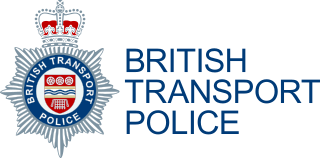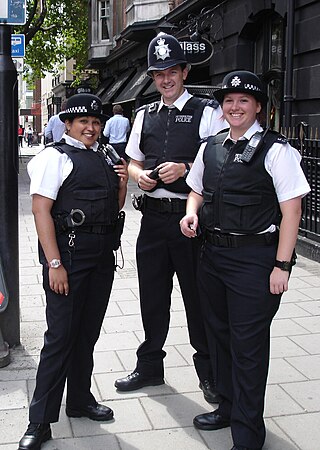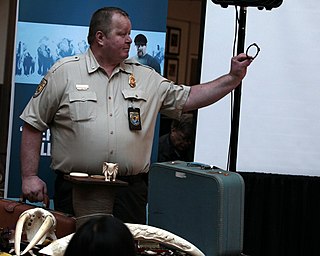
The Terrorism Act 2000 is the first of a number of general Terrorism Acts passed by the Parliament of the United Kingdom. It superseded and repealed the Prevention of Terrorism Act 1989 and the Northern Ireland Act 1996. It also replaced parts of the Criminal Justice Act 1998. The powers it provides the police have been controversial, leading to noted cases of alleged abuse, and to legal challenges in British and European courts. The stop-and-search powers under section 44 of the Act have been ruled illegal by the European Court of Human Rights.
A citizen's arrest is an arrest made by a private citizen – a person who is not acting as a sworn law-enforcement official. In common law jurisdictions, the practice dates back to medieval England and the English common law, in which sheriffs encouraged ordinary citizens to help apprehend law breakers.

British Transport Police is a national special police force that polices the railway network of England, Wales and Scotland. The force polices more than 10,000 miles of track and more than 3,000 stations and depots.

Law enforcement in the United Kingdom is organised separately in each of the legal systems of the United Kingdom: England and Wales, Scotland, and Northern Ireland. Most law enforcement duties are carried out by those who hold the office of police constable of a territorial police force.

The Serious Organised Crime Agency (SOCA) was a non-departmental public body of the Government of the United Kingdom which existed from 1 April 2006 until 7 October 2013. SOCA was a national law enforcement agency with Home Office sponsorship, established as a body corporate under Section 1 of the Serious Organised Crime and Police Act 2005. It operated within the United Kingdom and collaborated with many foreign law enforcement and intelligence agencies.

A customs officer is a law enforcement agent who enforces customs laws, on behalf of a government.

Law enforcement in Australia is one of the three major components of the country's justice system, along with courts and corrections. Law enforcement officers are employed by all three levels of government – federal, state/territory, and local.

In Singapore, law enforcement is principally led by the Singapore Police Force (SPF), and supported by other agencies including the Singapore Prison Service, Central Narcotics Bureau, Corrupt Practices Investigation Bureau, Internal Security Department, Immigration and Checkpoints Authority, and Singapore Customs. Furthermore, some law enforcement powers may be exercised by non-government entities such as auxiliary police forces and security officers.

The Police and Criminal Evidence Act 1984 (PACE) is an act of Parliament which instituted a legislative framework for the powers of police officers in England and Wales to combat crime, and provided codes of practice for the exercise of those powers. Part VI of PACE required the Home Secretary to issue Codes of Practice governing police powers. The aim of PACE is to establish a balance between the powers of the police in England and Wales and the rights and freedoms of the public. Equivalent provision is made for Northern Ireland by the Police and Criminal Evidence Order 1989 (SI 1989/1341). The equivalent in Scots Law is the Criminal Procedure (Scotland) Act 1995.
The power of arrest is a mandate given by a central authority that allows an individual to remove a criminal's liberty. The power of arrest can also be used to protect a person, or persons from harm or to protect damage to property. However, in many countries, a person also has powers of arrest under citizen's arrest or any person arrest / breach of the peace arrest powers.

The Immigration and Checkpoints Authority (ICA) is a law enforcement agency within the Ministry of Home Affairs (MHA), the border control agency responsible for frontline border control operations at air, sea and rail ports in Singapore.

The UK Border Agency (UKBA) was the border control agency of the Government of the United Kingdom and part of the Home Office that was superseded by UK Visas and Immigration, Border Force and Immigration Enforcement in April 2013. It was formed as an executive agency on 1 April 2008 by a merger of the Border and Immigration Agency (BIA), UKvisas and the detection functions of HM Revenue and Customs. The decision to create a single border control organisation was taken following a Cabinet Office report.
A civil enforcement officer is a person employed to enforce parking, traffic and other restrictions and laws.

A wildlife inspector is a person empowered by law to protect wildlife.
The powers of the police in England and Wales are defined largely by statute law, with the main sources of power being the Police and Criminal Evidence Act 1984 and the Police Act 1996. This article covers the powers of police officers of territorial police forces only, but a police officer in one of the UK's special police forces can utilise extended jurisdiction powers outside of their normal jurisdiction in certain defined situations as set out in statute. In law, police powers are given to constables. All police officers in England and Wales are "constables" in law whatever their rank. Certain police powers are also available to a limited extent to police community support officers and other non warranted positions such as police civilian investigators or designated detention officers employed by some police forces even though they are not constables.

The National Crime Agency (NCA) is a national law enforcement agency in the United Kingdom. It is the UK's lead agency against organised crime; human, weapon and drug trafficking; cybercrime; and economic crime that goes across regional and international borders, but it can be tasked to investigate any crime. The NCA has a strategic role as part of which it looks at serious crime in aggregate across the UK, especially analysing how organised criminals are operating and how they can be disrupted. To do this, it works closely with regional organised crime units (ROCUs), local police forces, and other government departments and agencies.

Border Force (BF) is a British law enforcement command within the Home Office, responsible for frontline border control operations at air, sea and rail ports in the United Kingdom. The force was part of the now defunct UK Border Agency from its establishment in 2008 until Home Secretary Theresa May demerged it in March 2012 after severe criticism of the senior management.
Since the creation of modern immigration controls in 1905, foreign nationals evading immigration control or committing crimes were regarded as a police matter and those people arrested were put before the courts whereupon they would be prosecuted and go through the deportation process. The United Kingdom Immigration Service's enforcement arm evolved gradually from the early 1970s onwards to meet demand from police for assistance in dealing with foreign national offenders and suspected immigration offenders within the UK. The wider history of UK immigration control is dealt with under UK immigration control - history.
Immigration Enforcement (IE) is a law enforcement command within the Home Office, responsible for enforcing immigration law across the United Kingdom. The force was part of the now defunct UK Border Agency from its establishment in 2008 until Home Secretary Theresa May demerged it in March 2012 after severe criticism of the senior management. Immigration Enforcement was formed on 1 March 2012, becoming accountable directly to ministers.










